-
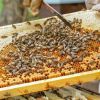 +10 +1
+10 +1Honeybee populations could be wiped out worldwide by wing virus
The global bee population could be endangered by a newly discovered deadly virus, a leading scientist has warned.
-
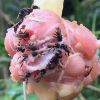 +24 +1
+24 +1Meat-eating bees have something in common with vultures
Mention foraging bees, and most people will picture insects flitting from flower to flower in search of nectar. But in the jungles of Central and South America, so-called vulture bees have developed a taste for flesh. Scientists have puzzled over why the stingless buzzers seem to prefer rotting carcasses to nectar. Now one group of researchers thinks it has cracked the riddle. The key came from looking into the bees’ guts.
-
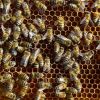 +4 +1
+4 +1Honeybees increase social distancing in response to a common parasite
In news-medical.net published an article which states that Honeybees increase social distancing when their hive is under threat from a parasite, finds a new study led by an international team involving researchers at UCL and the University of Sassari, Italy.
-
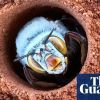 +14 +1
+14 +1‘So fluffy they’re like teddy bears’: thousands of native bees emerge in Western Australia
Higher than average rainfall and growth of the bees’ two favourite flowers could account for the larger than usual colony
-
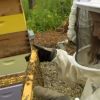 +4 +1
+4 +111-year-old launches campaign to save the bees: "We're going to win"
Scarlett Harper is fearless, especially when it comes to bees. When the 11-year-old Illinois resident learned the bees in her neighborhood were being wiped out by mosquito pesticides, she launched a campaign to save them. "Go make some phone calls, get some state reps on board, let's do this!" she said on Instagram in May.
-
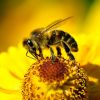 +15 +1
+15 +1Caffeine-boosted bees more efficiently home in on target flowers
A new study has found caffeine can be used to help bees locate specific flowers. The research suggests the drug enhances bee memory and makes them more efficient at homing in on certain targeted flowers.
-
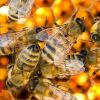 +25 +1
+25 +1Tech firms use remote monitoring to help honey bees
From Ireland to Israel, companies are coming to the aid of the environmentally critical insect.
-
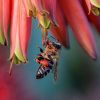 +17 +1
+17 +1A single honeybee has cloned itself hundreds of millions of times
The workers of a South African subspecies of honeybee can clone themselves, with one individual having done so many millions of times over the past 30 years. Some of the clones can even develop into queens that can take over the hive.
-
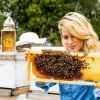 +23 +1
+23 +1'Over the top': backlash against TikTok's bee lady not justified, say bee experts
Erika Thompson is clearly a competent beekeeper, who's educating the public about honeybees in her own way on social media.
-
 +16 +1
+16 +1New 'superfood' for bees may be able to help detoxify hives contaminated with pesticides
Researchers have synthesized a particle as small as pollen, which, when fed to bees, may be able to help them to detoxify hives damaged by pesticides, in an effort to protect the insects.
-
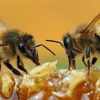 +20 +1
+20 +1'Unbelievable' Video Shows Two Bees Work Together to Unscrew a Soda Bottle
While we all recognize bees for their importance in our food chain as pollinators, the clever creatures have a series of other talents, including math ability, face recognition, and even tool use.
-
 +10 +1
+10 +1"The whole situation is tragic": About a million bees died when left on a hot UPS truck for weeks
An expert says most could have been saved if a beekeeper had been called in sooner.
-
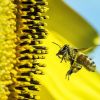 +2 +1
+2 +1A new method for delivering insecticide antidote could boost bee survival
Microparticles that detoxify insecticides in bee guts could help beekeepers keep their hives healthy and productive, according to a new study.
-
 +15 +1
+15 +1Roads and highways disrupt bee pollination
The world's network of road and highways may be harming insects and the plants they pollinate. Roads and highways may be harming plants and bees.
-
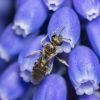 +3 +1
+3 +1We haven’t seen a quarter of known bee species since the 1990s
Bees feed us. Many of the 20,000 species pollinate 85 percent of food crops and fruits around the world—everything from garlic and grapefruits to coffee and kale. But, it seems, these crucial insects aren’t doing very well. A study published today in the journal One Earth reveals that in recent decades, the number of bee species reported in the wild has declined globally. The sharpest decrease occurred between 2006 and 2015, with roughly 25 percent fewer species spotted—even as sightings by citizen scientists were increasing rapidly.
-
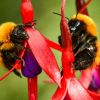 +17 +1
+17 +1A quarter of all known bee species haven't been seen since the 1990s
The number of bee species appears to have declined sharply in the past 30 years, which could mean many types of bee are extinct or so rare that no one has recording a sighting
-
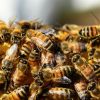 +25 +1
+25 +1Bees Are Now Considered The Most Important Living Thing On Earth
We may have our own opinions as to what is important in life but when it comes to important creatures, it seems as if bees have that title sewn up. At the last meeting of the Royal Geographical Society of London, the EarthWatch Institute came to a startling conclusion. They declared that bees are the most important living being on the planet, and for good reason.
-
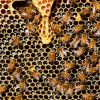 +4 +1
+4 +1Pesticide deadly to bees now easily detected in honey
A common insecticide that is a major hazard for honeybees is now effectively detected in honey thanks to a simple new method. Researchers at the University of Waterloo developed an environmentally friendly, fully automated technique that extracts pyrethroids from the honey.
-
 +11 +1
+11 +1The bee population is dying. Researchers have created the first global map of the species to try and help save them
More than 20,000 species of bee exist throughout the world -- and they are dying, thanks to climate change, pesticide poisoning and plant loss.
-
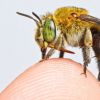 +26 +1
+26 +1Global map of bees created in conservation first
The data will help protect vital pollinators and could lead to new bee discoveries, say scientists.
Submit a link
Start a discussion




















